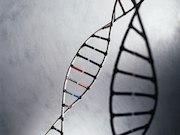Mutational signatures better report mismatch repair deficiency than sequencing of MMR genes
THURSDAY, Sept. 14, 2017 (HealthDay News) — Mutational signatures could more accurately identify mismatch repair (MMR)-deficiency than sequencing of MMR genes, according to a study published online Sept. 13 in Cancer Research.
Helen Davies, M.D., from the Wellcome Trust Sanger Institute in Hinxton, U.K., and colleagues utilized patterns of mutagenesis, which are imprints of the mutagenic processes associated with MMR deficiency, to identify MMR-deficient breast tumors from a dataset comprising 640 patients.
The researchers identified 11 of the tumors as MMR deficient; only two had germline mutations in MMR genes or Lynch Syndrome. A substantially reduced number of mutations attributed to MMR deficiency were identified in two additional tumors, where the predominant mutational signatures were related to APOBEC enzymatic activity. Genetic or epigenetic confirmation of abrogation of MMR genes occurred in six of 11 of the MMR-deficient cases in this cohort. All but one of 10 samples available for testing were revealed as MMR deficient in immunohistochemistry analysis.
“The mutational signatures more faithfully reported MMR deficiency than sequencing of MMR genes, because they represent a direct pathophysiologic readout of repair pathway abnormalities,” the authors write. “As whole-genome sequencing continues to become more affordable, it could be used to expose individually abnormal tumors in tissue types where MMR deficiency has been rarely detected, but also rarely sought.”
Several authors disclosed ownership interests in applied patents; one author disclosed financial ties to Artios Pharma Ltd.
Copyright © 2017 HealthDay. All rights reserved.








